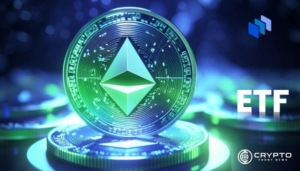The cryptocurrency market in 2025 is experiencing significant shifts. Ethereum’s recent upgrades and OKB’s strategic partnerships are reshaping the digital finance landscape. Amidst these developments, Qubetics is emerging as a noteworthy player, addressing challenges that have long plagued the industry.
Ethereum’s implementation of EIP-4844 has enhanced its scalability, making it more efficient for decentralized applications. OKB, on the other hand, has expanded its ecosystem through new collaborations, increasing its utility and adoption. These advancements are influencing buyer sentiment and market dynamics.
Qubetics stands out by offering solutions to interoperability issues that have hindered blockchain integration. Its focus on seamless connectivity between different blockchain networks positions it as a forward-thinking platform in the evolving digital finance sector.
Qubetics: Bridging Blockchain Gaps
Qubetics is addressing the critical issue of interoperability in the blockchain space. By facilitating seamless communication between disparate blockchain networks, it enables businesses and individuals to operate more efficiently in a decentralized environment.
The platform’s ongoing crypto presale, now in its 33rd stage, has garnered significant attention. Over 511 million $TICS tokens have been sold to more than 26,000 holders, raising upwards of $16.8 million. The current price per token stands at $0.2302. Analysts suggest that post-crypto presale, the token could see substantial returns, with projections indicating a potential rise to $1, $5, or even $15, depending on market conditions.
Qubetics’ emphasis on interoperability is particularly relevant for businesses seeking to integrate blockchain technology without overhauling their existing systems. By providing tools that allow for easy interaction between different blockchains, Qubetics is reducing the barriers to entry for companies interested in decentralized solutions.
Furthermore, Qubetics is not just focusing on technical aspects but also on user experience. The platform aims to simplify blockchain interactions, making them more accessible to non-technical users. This approach could accelerate the adoption of blockchain technology across various industries.
Ethereum: Scaling New Heights
Ethereum continues to solidify its position as a leading blockchain platform. The recent implementation of EIP-4844 has introduced significant improvements in scalability and efficiency. This upgrade has reduced data posting costs for rollups, enhancing the overall performance of decentralized applications on the network.
The transition to a proof-of-stake consensus mechanism has also contributed to Ethereum’s growth. By reducing energy consumption and increasing transaction throughput, Ethereum is becoming more sustainable and scalable. These developments are attracting institutional interest and fostering greater adoption.
Moreover, Ethereum’s role in the decentralized finance (DeFi) sector remains strong. The platform supports a wide range of DeFi applications, providing users with access to financial services without traditional intermediaries. This decentralized approach is reshaping the financial landscape, offering more inclusive and transparent alternatives.
Ethereum’s commitment to continuous improvement is evident in its roadmap. Future upgrades aim to further enhance scalability, security, and user experience. These planned developments indicate a proactive approach to addressing the evolving needs of the blockchain ecosystem.
In essence, Ethereum’s recent upgrades and strategic direction underscore its commitment to innovation and adaptability. Its robust infrastructure and active community support its ongoing relevance in the rapidly changing world of digital finance.
OKB: Expanding Horizons
OKB, the native token of the OKX exchange, is experiencing growth through strategic partnerships and ecosystem expansion. The token’s utility extends beyond trading, encompassing various applications within the OKX ecosystem, including staking, governance, and access to exclusive features.
Recent collaborations have enhanced OKB’s visibility and adoption. By integrating with different platforms and services, OKB is increasing its use cases, making it more attractive to a broader audience. These partnerships are not only expanding the token’s reach but also reinforcing its value proposition.
The OKX exchange continues to innovate, offering users a range of services that leverage the OKB token. From advanced trading tools to educational resources, OKX is building a comprehensive ecosystem that supports both novice and experienced users.
OKB’s performance is also influenced by the overall growth of the OKX platform. As the exchange attracts more users and expands its offerings, the demand for OKB is likely to increase. This correlation underscores the importance of the exchange’s success in driving the token’s value.
In conclusion, OKB’s strategic initiatives and integration within the OKX ecosystem position it as a versatile and valuable asset in the cryptocurrency market. Its expanding utility and growing adoption reflect its potential for continued growth.
Understanding Interoperability in Blockchain
Interoperability is a critical factor in the evolution of blockchain technology. It refers to the ability of different blockchain networks to communicate and interact with each other seamlessly. This capability is essential for creating a cohesive and efficient decentralized ecosystem.
Key aspects of interoperability include:
- Cross-Chain Communication: Enabling transactions and data sharing between different blockchain networks.
- Standardization: Developing common protocols and standards to facilitate compatibility.
- Scalability: Allowing networks to handle increased load by distributing tasks across interoperable chains.
- User Accessibility: Simplifying the user experience by integrating multiple services into a unified interface.
- Security: Ensuring that interoperability does not compromise the security of individual networks.
By addressing these aspects, interoperability enhances the functionality and user experience of blockchain applications. It allows for more complex and integrated services, fostering innovation and adoption across various sectors.
Conclusion: Embracing the Future of Digital Finance
The cryptocurrency landscape in 2025 is marked by innovation and strategic growth. Qubetics, Ethereum, and OKB exemplify different facets of this evolution, each contributing uniquely to the advancement of blockchain technology.
Qubetics is tackling interoperability challenges, making blockchain integration more accessible for businesses and individuals. Ethereum continues to lead in scalability and DeFi applications, while OKB is expanding its utility through strategic partnerships.
For those exploring top cryptos to invest in today, these three projects offer compelling opportunities. Their ongoing developments and market positioning suggest potential for significant impact in the digital finance sector.
- Qubetics: https://qubetics.com
- Presale: https://buy.qubetics.com
- Telegram: https://t.me/qubetics
- Twitter: https://x.com/qubetics
Frequently Asked Questions
What is Qubetics and its primary focus?
Qubetics is a blockchain platform focusing on interoperability, enabling seamless communication between different blockchain networks.
How has Ethereum improved its scalability?
Ethereum implemented EIP-4844, reducing data posting costs for rollups and enhancing overall network efficiency.
What are the utilities of the OKB token?
OKB is used within the OKX ecosystem for trading, staking, governance, and accessing exclusive features.
Why is interoperability important in blockchain?
Interoperability allows different blockchain networks to interact, facilitating more integrated and efficient decentralized applications.
What makes Qubetics’ presale noteworthy?
Qubetics’ presale has raised over $16.8 million, selling more than 511 million tokens to over 26,000 holders, indicating strong market interest.
How does Ethereum’s proof-of-stake mechanism work?
Validators are selected based on the amount of ETH they stake, contributing to network security and earning rewards.
What role does OKX play in OKB’s value?
The growth and innovation of the OKX exchange directly influence the demand and utility of the OKB token.




